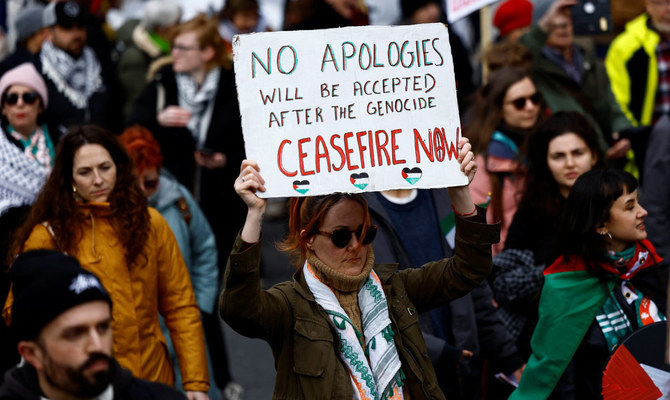RIYADH/COPENHAGEN: Saudi Arabia said Wednesday it welcomed the “positive” decision taken by Norway, Spain, and Ireland to recognize a Palestinian state.
The Kingdom said it appreciated this decision “which confirms the international consensus on the inherent right of the Palestinian people to self-determination,” in a foreign ministry statement.
The kingdom also called on more countries to swiftly take the same stance, “which would contribute to finding a reliable and irreversible path to achieve a just and lasting peace that fulfills the rights of the Palestinian people.”
Leaders of Norway, Spain and Ireland said on Wednesday they were formally going to recognize Palestine as a state.
Norwegian Prime Minister Jonas Gahr Store said: “There cannot be peace in the Middle East if there is no recognition.”
Spanish Prime Minister Pedro Sanchez also announced that the country’s council of ministers would recognize an independent Palestinian state on Tuesday May 28.
“Next Tuesday, May 28, Spain’s cabinet will approve the recognition of the Palestinian state,” he said, adding that his Israeli counterpart Benjamin Netanyahu was putting the two state solution in “danger” with his policy of “pain and destruction” in the Gaza Strip.
Irish Prime Minister Simon Harris said it was a move coordinated with Spain and Norway, marking “an historic and important day for Ireland and for Palestine.”
The Palestinian Authority and its rival group Hamas both welcomed the recognition of a Palestinian state by Ireland, Spain and Norway.
The Palestinian Authority exercises limited self-rule in the West Bank territory while Hamas runs Gaza.
Jordan hailed the coordinated move as an “important and essential step towards Palestinian statehood.”
“We value this decision and consider it an important and essential step towards a two-state solution that embodies an independent, sovereign Palestinian state along the July 1967 borders,” Jordanian Foreign Minister Ayman Safadi told a press conference.
Qatar’s foreign ministry welcomed the announcement as an “important step in support of a two-state solution,” expressing hope that other countries would follow suit.
The six-member Gulf Cooperation Council also spoke out in support of the European countries’ move, with secretary general Jasem Mohamed Albudaiwi saying it represented “a pivotal and strategic step towards achieving the two-state solution” to the Israeli-Palestinian conflict, a statement said.
The Organisation of Islamic Cooperation, based in the Saudi city of Jeddah, similarly welcomed the move as an “important historic step”.
Several European Union countries have in the past weeks indicated that they plan to make the recognition, arguing a two-state solution is essential for lasting peace in the region.
Israel recalled envoys to Spain, Ireland and Norway over their moves to recognize a Palestinian state.
“Today, I am sending a sharp message to Ireland and Norway: Israel will not go over this in silence. I have just ordered the return of the Israeli ambassadors from Dublin and Oslo to Israel for further consultations in Jerusalem,” Foreign Minister Israel Katz said in a statement.
Sanchez said in March that Spain and Ireland, along with Slovenia and Malta, had agreed to take their first steps toward Palestinian recognition, seeing a two-state solution as essential for lasting peace.
The efforts come as a mounting death toll in Gaza from Israel’s offensive to rout Hamas prompts calls globally for a ceasefire and lasting solution for peace in the region.
Norway, which is not a member of the European Union but mirror its moves, has been an ardent supporter of a two-state solution between Israel and the Palestinians.
“The terror has been committed by Hamas and militant groups who are not supporters of a two-state solution and the state of Israel,” the Norwegian government leader said.
“Palestine has a fundamental right to an independent state,” Gahr Store told a press conference.
The move comes as Israeli forces have led assaults on the northern and southern edges of the Gaza Strip in May, causing a new exodus of hundreds of thousands of people, and sharply restricted the flow of aid, raising the risk of famine.
The Scandinavian country “will therefore regard Palestine as an independent state with all the rights and obligations that entails,” Gahr Store said.
Norway’s recognition of a Palestine state comes more than 30 years after the first Oslo agreement was signed in 1993.
Since then, “the Palestinians have taken important steps toward a two-state solution,” the Norwegian government said.
It said that the World Bank determined that Palestine had met key criteria to function as a state in 2011, that national institutions have been built up to provide the population with important services.
“The war in Gaza and the constant expansion of illegal settlements in the West Bank still mean that the situation in Palestine is more difficult than it has been in decades,” the Norwegian government said.






























